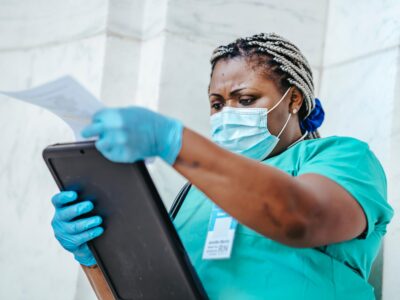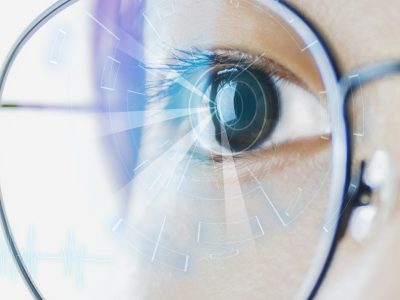When the going got tough, the tough got going—to nursing school. Here’s why the pandemic fueled a surge of applications.
This spring, as the images first surfaced of desperate hospital workers scrambling for makeshift masks, a 25 year-old personal banker from Bellingham, Massachusetts named Justin Andrews applied to the 16 month accelerated bachelor of science in nursing (ABSN) program at Regis College. Andrews, who received his BS in psychology and communications from Worcester State College in 2017, had “this feeling of regret I didn’t study nursing” after graduating but he didn’t submit his application until the height of the PPE shortages.
If the notion of leaving the relative security and safety of an office job for all of the risks associated with nursing in a pandemic seems counter-intuitive, consider that in the period from March 11 through August 31st of this year, the accelerated nursing programs at Regis received 117% more inquiries than in the same period the year before. Although national statistics aren’t yet available, the nursing profession clearly saw a spike in interest.

“Seeing my aunt work so hard in the emergency room and the news showing the nurses battling the virus made me want to join the fight with even more passion.”
– Justin Andrews on his aunt Katie Bolles
Are we looking at a different breed of nurse, perhaps one with a mindset closer to firefighters, EMTs and other first responders—or has the profession always drawn the type of individual inclined to run toward the fire? “Yes, I believe I am the person who rushes to the fire,” Andrews says. He was inspired by his aunt, a nurse at St. Elizabeth’s Hospital in Boston. “Seeing my aunt work so hard in the emergency room and the news showing the nurses battling the virus made me want to join the fight with even more passion.”
“It has been a very scary time to be a nurse, however one of my proudest as well.”
– Katie Bolles, Nurse
Katie Bolles, Andrews’ aunt, graduated from St. Elizabeth’s School of Nursing in 1991. Though the school closed in 2000, she continues working at the hospital, the last eleven years in the E.R.. “These past months have been like no other in my career,” she writes. “It has been a very scary time to be a nurse, however one of my proudest as well.”
The mindset runs in the family. “One evening, I was sitting in my room, because I was isolating away from my family due to being exposed to COVID-19 so much in the E.R.,” Bolles recalls. “I received a text from Justin just wanting to check on me and how I was holding up through it all. I asked him if he still felt the desire to become a nurse. He immediately responded, ‘Pandemics happen. But we need people to help others.’”
For Andrews, talking with his aunt and watching the story unfold on the news, PPE crisis and all, actually “added some fuel to the fire. I was sitting in the bank just answering the phone or doing some tidily things while people were risking their lives to make sure someone’s family member survived this virus and got to go home.”

“I think that running toward the fire is part of what nurses do. We put out fires all the time.”
-Regis College Associate Professor Anne Fryer
When Andrews began looking into making a career transition, he spoke with Anne Fryer, a longtime bank client and an associate professor of nursing at Regis. Fryer had always noticed how he interacted with customers, how he’s “a very empathetic, compassionate person.” Observing him during the COVID crisis, “I watch him talk to people that are bringing all sorts of baggage with them and fear. I think that running toward the fire is part of what nurses do. We put out fires all the time. I think he will do very well.”
Andrews’ personality type may be an ideal fit for the nursing profession but how many others are willing to put themselves at personal risk to save the lives of complete strangers? After all, until the pandemic, nursing was never considered to be one of those vocations like police officers, firefighters, even EMTs, for whom putting their lives on the line was a part of their job description—or was it?
“Every time a nurse steps into a patient’s room or works with a person in the community from schools to prisons to nursing homes, we never know who or what issues we may encounter,” writes Beverly Malone, PhD, RN, FAAN, Chief Executive Officer of the National League for Nursing. “Most nurses have always seen their career as a call to duty, a mission aligned opportunity to make a difference in the world.”

As program director of the accelerated BSN at Regis, Associate Professor Elizabeth Landers has a pivotal role in selecting students. While she believes “The motivation for being a nurse hasn’t changed,” Landers has noticed “an increase in those who have always thought about it but never felt the time was right. They needed the extra push, and I think this health care crisis provided just that. I do find there are more questions about risk than before and it’s something I often struggle to answer. Is there a risk? Yes, of course—there always has been. Are there ways to be safe? Yes, most definitely. Part of our job as educators is to give students the knowledge and tools to be safe and [that] is a foundational concept of our entire program.”
For a working nurse with two young children like Landers, the question of risk is far from academic. And, while Justin Andrews’ aunt Katie Bolles says, “If it’s truly in your heart to be a nurse, you put aside the risks and do what you have to do to help the most people,” she confesses that “My greatest fear of all was that of infecting my family. I struggled with the fact that I had chosen this profession and risks that went along with it, not my husband and children.”
Is there a risk? Yes, of course—there always has been. Are there ways to be safe? Yes, most definitely.
Regis Associate Professor Elizabeth Landers, PhD
Elizabeth Svoboda, author of What Makes a Hero – The Surprising Science of Selflessness, views interest in the profession in psychological terms. “I’m sure these applicants realized the risks they might be facing, but decided to commit to nursing because they knew it offered them an unequalled opportunity to help during a time of crisis.” Svoboda frames altruism as a “win-win venture. We help someone, so they benefit, but we also benefit by knowing that we’re improving someone else’s situation. That kind of engagement gives us a psychological boost.”

Georgetown University Psychology Professor Abigail Marsh, who wrote an entire book about a single emotion, The Fear Factor, takes the prospect of peril a step further. She believes that “The fact that nursing is challenging is also sort of the point. Overcoming challenges and risks actually contributes to a sense of purpose.” If interest in the field is growing during the pandemic, she says, “I would guess that people perceive that their role in healthcare is more highly valued than in the past now that people have had the chance to learn more about the risks nurses face in order to save lives.”
Vocationally, it comes down to risk versus reward. “There is lots of evidence that people are happiest in professions where they feel a sense of purpose and mission, and that they are contributing to outcomes they inherently value,” Professor Marsh continues. “I can imagine people in jobs where they did not feel this way may have newly recognized that nursing is a profession that would provide this sense of mission and purpose.”

Or, perhaps, zookeeping. In the book The Zookeeper’s Secret: Finding Your Calling in Life, Brigham Young University Business Professor Jeffery Thompson described the job this way: “The work is backbreaking, smelly, dangerous, emotionally draining and underappreciated. And yet, zookeepers exhibited the highest levels of work commitment that I have ever witnessed as a researcher.” As he points out, these are generally well-educated individuals who have options. So, what explains the apparent disconnect? “It seems to boil down to three things: 1. they feel hardwired to work with animals. It’s always been their gift; 2. It’s not just a job, it’s an obligation to serve animals and 3. Virtually every zookeeper I spoke with feels lucky…I think the key here is that they have a sense of gratitude about the opportunity to do work that is meaningful to them.”
Unlike zookeeping, which Thompson also points out has “basically poverty-level wages with no opportunities for upward advancement,” nurses can make an excellent living and the profession offers plenty of room for growth. Yet there is a parallel in the sense of dedication, mission, and the sense that each is more than just a job.
“Nursing is a calling, and many of us chose this profession because of the impact we would have on others,” Landers says. “This is truly an unprecedented time, and those who have always considered nursing hear that calling even louder when there are so many in need.”
The increasing number of nursing school applications during the greatest healthcare crisis of our lifetime is encouraging but will there a steady stream of people like Justin Andrews whose devotion to helping others eclipse their fears about personal safety?
For those who are, Elizabeth Landers offers this commitment: “While I can’t ensure that you’re always going to be in safe situations as a practicing nurse, I can promise you that we will teach you how to navigate that risk throughout your career.”
And, she adds, nursing also lends itself to those who are more risk averse: “Like I love to remind my students, there are a million ways to be a nurse. Just because you have the license doesn’t mean you need to be in the trenches. I know many brilliant nurses working behind the scenes, conducting telehealth screenings, building and managing information technology that makes their communication safer and timelier, providing education for both patients and healthcare providers. Everyone will find their own path to make a difference.”
Written by: Andy Levinsky, Regis College

















